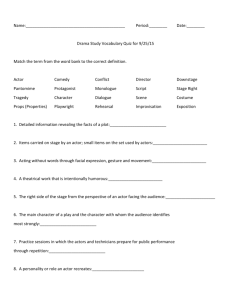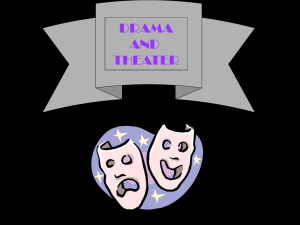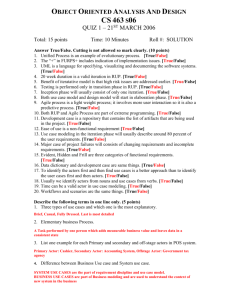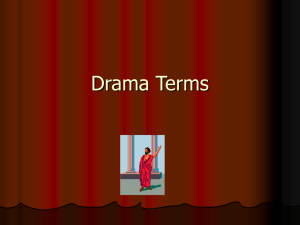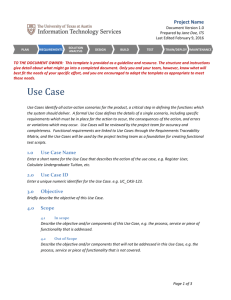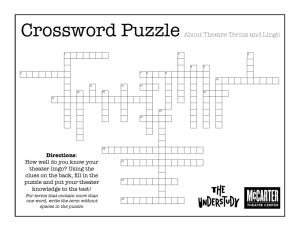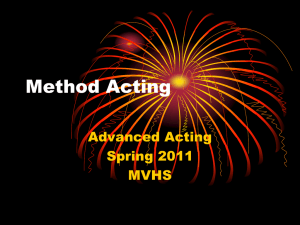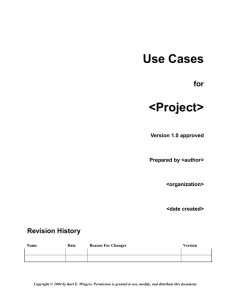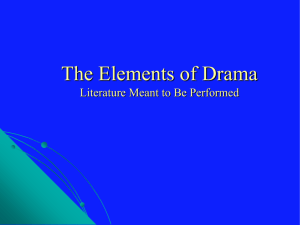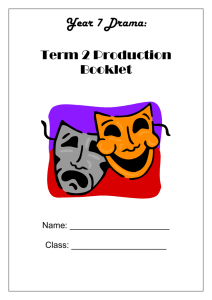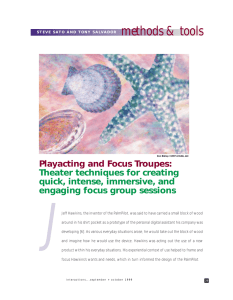Quarter 1 Warm-Ups
advertisement
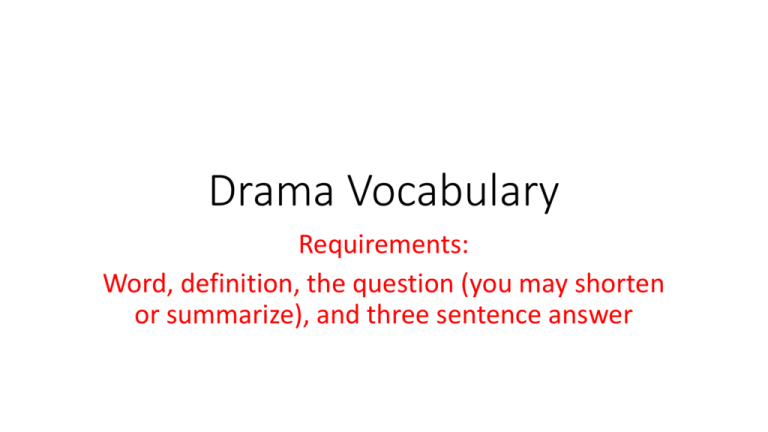
Drama Vocabulary Requirements: Word, definition, the question (you may shorten or summarize), and three sentence answer THOUGHT OF THE DAY: DO SOMETHING TODAY THAT MAKES OTHERS SMILE ▪ 1. ACT: ▪ V) to perform by representing a character in a play. ▪ N) The major division of a play ▪ Question: ▪ What does acting mean to you? ▪ Three complete sentences please. VOCABULARY 2. PROPS: All articles except costumes and scenery used as part of a dramatic production. Large objects like furniture are called stage props. Small props carried or moved by the actor are called hand props. Give two examples of what could be a stage prop and what could be a hand prop. THOUGHT OF THE DAY: A JOKE IS ONLY A JOKE IF PEOPLE LAUGH . . . 3. Lines: The lines of a play are its dialogue. When you get a part in a play, you have to “memorize your lines.” Can you think of any famous lines/movie quotes that you remember from seeing a movie or play? If not, ask your neighbor to help you. Why was that line memorable? THOUGHT OF THE DAY: BE YOURSELF. NOBODY ELSE CAN DO THAT FOR YOU. 4. Conflict: The main problem of the play. A play cannot exist without conflict! Even comedies have a conflict. Why do you think a play HAS to have conflict? What would a play be like without a conflict? THOUGHT OF THE DAY: WE CANNOT KNOW WHAT GOOD IS WITHOUT ALSO KNOWING WHAT IS BAD . Vocabulary: 5. Blocking (v): Working out the movements of actors on stage- includes planning the entrances, exits, crosses, etc. Question (Three sentences): Why would it be important for a writer to include blocking in his/her script? Why does blocking matter? THOUGHT OF THE DAY: A GREAT ARTIST IS ONE WHO OBSERVES THE WORLD AROUND THEM. Vocabulary: ▪ 6. CHEAT OUT: To turn your body slightly towards the audience while conversing with another. ▪ Why would an actor need to do this in a play and not a movie? Explain and give an example. THOUGHT OF THE DAY: THE RISK OF TAKING NO RISKS IS THE WORST RISK OF ALL. 7. Comic Relief: Comedy inserted in an otherwise heavy/dramatic play. Used to bring relief to the audience from the tenseness of the action in a play. Can you think of an example in either a play, movie, tv show, or book where there is comic relief? Either through a funny character, line, situation. If you can’t think of an example, give one from your own life or one you have observed. THOUGHT OF THE DAY: “A DAY WITHOUT SUNSHINE IS LIKE, YOU KNOW, NIGHT.” STEVE MARTIN 8. MILK: to milk an audience is to get all one can out of an audience. In an extremely funny situation, an actor can milk his audience through double-takes, gestures, and other forms of OVER ACTING. Sometimes it works, but if done too frequently, will annoy an audience. Question: Have you ever “milked” a situation? At home? In a classroom? On stage? If not, give an example in which you have seen THOUGHT OF THE DAY: IF YOU WOULD CREATE SOMETHING, YOU MUST BE SOMETHING. Vocabulary: ▪ 9. Cue (n): A signal or movement that tells a performer to carry out the next action. Question (three sentences) Why are cues important in a play for actors? THOUGHT OF THE DAY: THE JOB OF AN ARTIST IS NOT TO SEE THE BLACK AND WHITE OF THE WORLD, BUT TO SEE THE GREY AND EVERY SHADE IN BETWEEN. 10. READER’S THEATER: An oral interpretation of drama by a group of performers standing or sitting on stage. Action or physical movement is merely suggested and is visualized in the minds of the audience. Scenery and costumes are not used. Question: Why would the actor’s CHARACTER VOICE be very important in a production of reader’s theater? Give an example. THOUGHT OF THE DAY: THEATER IS THE ONLY MEDIUM IN WHICH THE AUDIENCES’ REACTIONS CHANGE/AFFECT THE PERFORMANCE. 11. Characterization: A representation of a character’s qualities. Shown through dialogue, gesture, movement, voice, costume, and makeup. Question (3 sentences): Think about a character you’ve seen in movie or play. What made his/her character stand out to you and WHY? THOUGHT OF THE DAY:: ACTING IS BEHAVING TRUTHFULLY UNDER IMAGINARY CIRCUMSTANCES. ~ SANFORD MEISNER 12. Actor: a person on stage, who by prior performance and training has been selected by a director to act a role in a production. Question (Three sentences): Who is your favorite actor and WHY? THOUGHT OF THE DAY: WHEN YOU LIVE IN THE MOMENT, THERE IS NO FUTURE OR PAST, ONLY RIGHT NOW. ▪ 13. Casting: The selection of actors for a performance ▪ A “casting director” selects actors to audition for the main director of the show. Why do you think directors need the help of a casting director? Why is a casting director important? THOUGHT OF THE DAY: CONFLICT IS WHAT CREATES DRAMA. THE MORE CONFLICT ACTORS FIND, THE MORE INTERESTING THE PERFORMANCE. ▪ 14. FREEZE: Actors freeze in position, without movement, which usually marks a break in action or a monologue, the closing of a scene, or the end of a play. ▪ Do actors need to do this in a movie? Why or why not? Explain. THOUGHT OF THE DAY: IF YOU REALLY DO WANT TO BE AN ACTOR WHO CAN SATISFY HIMSELF AND HIS AUDIENCE, YOU NEED TO BE VULNERABLE. 15. Get the Hook!: An old term meaning to get the actor off the stage. At one time, a hook on the end of a long pole was used to literally pull the bad performer in to the wings. Why would we NEVER use this term in a drama class? What effect would it have on someone? THOUGHT OF THE DAY: TALK TO SOMEONE TODAY THAT YOU’VE NEVER SPOKEN TO BEFORE. YOU MIGHT MAKE A NEW FRIEND! 16. Stage Areas: There are nine major areas of the stage: downstage L, C, R, center L, C, R, and upstage L, C, R Why is it important to have different areas of the stage? How does this help the actors and the directors in a play?
